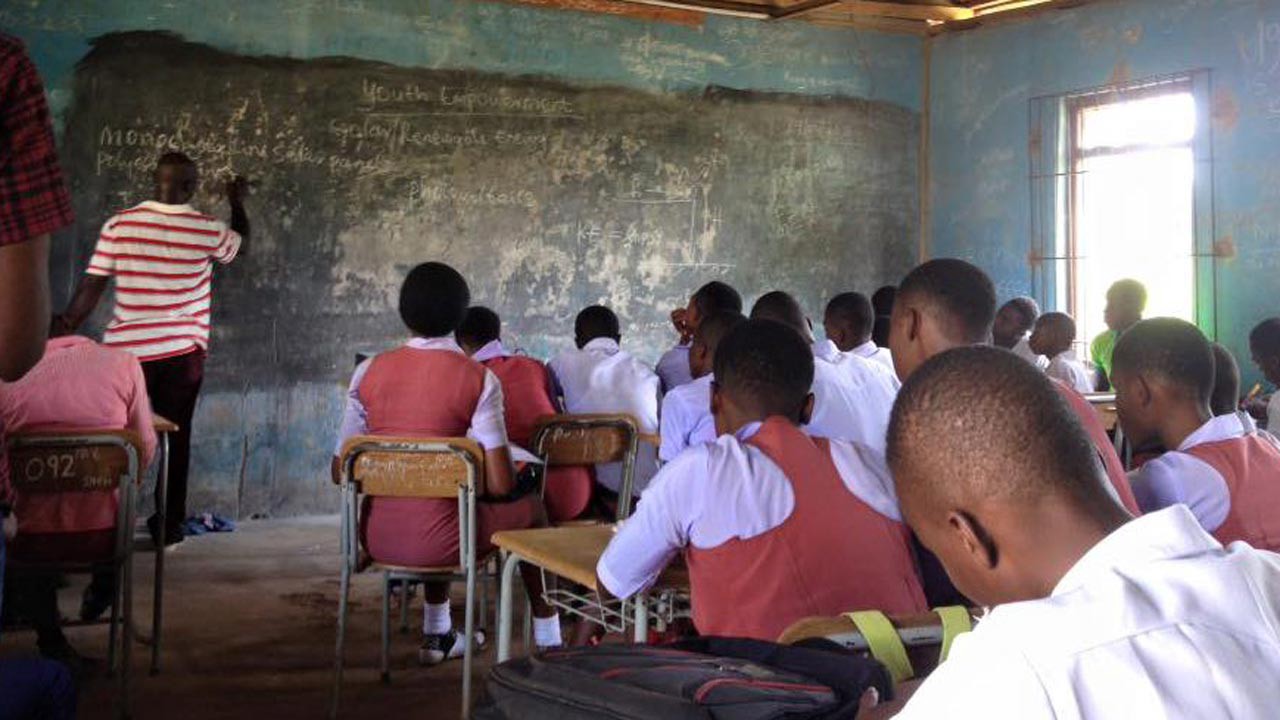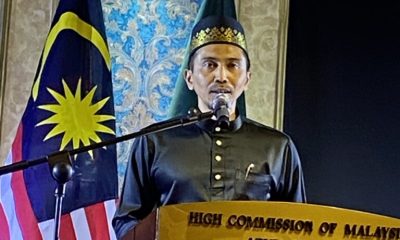Education
London conference urges Nigeria to upscale investment in education

A London conference on Monday called on the Nigerian government to upscale its investment in education to pull the West African country out of endemic poverty.
Speaking at a colloquium, marking Nigeria’s 62nd Independence, the keynote speaker, Mrs Ibironke Adeagbo, said that Nigeria could only turn the corner if an adequate investment was made in education.
Adeagbo is a Chartered Accountant and Chief Executive Officer of the UK charity, IA-Foundation, which is active in Nigeria.
According to her, Nigeria has not been able to fund education adequately over the years, despite its position as Africa’s top economy and crude oil exporter.
She said that despite the rich natural endowments of the country, which is also Africa’s most populous nation, the country had continued to wallow in poverty and underdevelopment after 62 years of independence.
Citing the worrisome statistics released recently by UNESCO that 20.2 million children in Nigeria were currently out of school, Adeagbo said that no magic would make economic development foster in the country.
“We have 20.2 million children who are not in school in Nigeria, ranking among India and Pakistan — how can our economy grow? Education and economic development go hand-in-hand.
“The huge number of out-of-school children in Nigeria is negatively impacting the nation’s economy and the standard of living of the people,’’ she added.
The child’s rights advocate argued that the high rate of children who cannot access quality education is also responsible for the festering insecurity in the country.
According to her, insecurity in the country has been hampering economic development and pushing many people in the vast nation into desperate want and poverty.
She charged the Federal Government to rise to the challenge of getting its citizens to embrace quality education “because the more educated people are the better their chances of building the economy’’.
Adeagbo decried what she described as the prevailing poor state of Nigeria’s education system, saying that it was characterized by distorted learning, poor infrastructure, unqualified teachers and incessant strikes.
The IA-Foundation founder argued that the way out was for Nigeria to increase its budgetary allocation to education year-on-year and also introduce policies that would make education attractive to citizens.
According to her, Nigeria needs to invest in human capital development through formal and informal education and ensure that education takes its pride in place.
(NAN)
Education
Nafisa Spoke, the World Listened, And Nigeria Shined

Nafisa Spoke, the World Listened, And Nigeria Shined
By Matthew Eloyi
When I first read about 17-year-old Nafisa Abdullah Aminu emerging as the World Best in English Language Skills at the 2025 TeenEagle Global Finals in London, I paused, read it again, and then sat quietly, moved in a way I haven’t been in a long time. In that moment, I wasn’t just a Nigerian reading a piece of good news; I was a Nigerian filled with pride, hope, and a renewed belief in our greatness.
Let me be honest: in a country weighed down by insecurity, economic hardship, and a struggling educational system, it’s easy, too easy, to become cynical. But Nafisa’s victory pierced through that fog of despair and reminded me why I have always believed in this country, despite everything.
Think about it: this young girl, from Yobe State, a region often reduced to a footnote in conversations about insecurity and poverty, stood on a global stage in London, not just to participate, but to conquer. She didn’t just win a medal. She defeated over 20,000 participants from 69 countries, including from places where English is a first language.
Let that sink in.
As someone who has spent years writing, editing, and advocating for better education in Nigeria, I understand just how powerful and rare this kind of achievement is. I see myself in Nafisa, in her curiosity, her hunger for knowledge, and her refusal to be boxed in by circumstance. Her story makes me emotional, not just because it’s inspiring, but because it reminds me of the many gifted Nigerian children who never get the chance to shine. Nafisa represents them, and she represents what’s possible when we choose to invest in our youth.
I am also deeply moved by the humility and grace of the Aminu family, who publicly acknowledged the role of Governor Mai Mala Buni’s educational reforms and the impact of Nigerian Tulip International College in preparing their daughter for the global stage. This wasn’t a solo journey; it was a collective effort rooted in family values, good governance, and dedicated educators.
“We cannot take all the credit,” they said. And in that simple statement, they reminded me that when leadership, community, and family work together, magic happens.
Nafisa’s win isn’t just a win for Yobe State. It’s not even just a win for Nigeria. It’s a resounding answer to every doubt we’ve ever had about our potential as a nation. Her victory tells every Nigerian child that “you are enough, and the world will hear your voice if you dare to speak it.”
As I write this, I think about the millions of young girls in the North and across Nigeria who will see Nafisa’s face and think, “If she can do it, so can I.” That, right there, is the power of representation.
I join the growing chorus of voices calling for State and National Honours for Nafisa. We must celebrate her not just with headlines, but with action, by investing more in education, giving scholarships, and ensuring that no child with potential is left behind because of geography, gender, or poverty.
To Nafisa, if you ever read this, know that you didn’t just win a competition; you reignited a nation’s pride. You gave us something we desperately needed: a reason to believe again.
And to Nigeria, this is who we are: brilliant, resilient, and unstoppable when given a chance.
Nafisa didn’t just make Yobe proud. She made me proud. She made us proud.
Education
NELFUND Begins Upkeep Payments to Over 3,600 Students After Bank Detail Update

The Nigerian Education Loan Fund (NELFUND) has commenced the disbursement of upkeep payments to students who successfully updated their bank account details from digital wallets to commercial bank accounts.
This was announced in a statement released on Friday in Abuja by the Director of Strategic Communications of the Fund, Mrs. Oseyemi Oluwatuyi.
Oluwatuyi described the development as a significant breakthrough in addressing earlier disbursement delays.
“Over 3,600 students, who previously registered with digital-only banking platforms, have now successfully received their backlog of upkeep payments after updating their details to conventional commercial bank accounts on the NELFUND portal,” she stated.
“We appreciate the patience and understanding of all affected students during this period. Your resilience and cooperation have made this progress possible,” she added.
The NELFUND spokesperson advised students who have yet to update their bank details to raise a support ticket via the official NELFUND portal to request access for the update.
She further urged affected students to report through the IT office of their respective institutions, which would compile and forward all related cases to NELFUND for prompt resolution.
“NELFUND remains committed to ensuring that no eligible student is left behind. This resolution process is part of our broader effort to enhance the efficiency, transparency, and student-centered delivery of our support services,” she said.
Oluwatuyi encouraged students to continue engaging only through official NELFUND channels and to assist their peers who may need help navigating the update process.
She also provided contact options for inquiries, stating that the fund can be reached via email at info@nelf.gov.ng or through its official social media handles: X (formerly Twitter) @nelfund; Instagram @nelfund; and Facebook & LinkedIn: Nigerian Education Loan Fund – NELFUND.
Education
NELFUND Urges Institutions to Upload Student Data for Loan Processing

The Nigerian Education Loan Fund (NELFUND) has issued a directive to all accredited tertiary institutions to verify and upload their students’ data on the newly digitised Student Loan Application System (SLAS).
This was disclosed in a statement released in Abuja on Wednesday by the Director of Strategic Communications at NELFUND, Mrs Oseyemi Oluwatuyi.
According to Oluwatuyi, the SLAS platform has been fully digitised to streamline and accelerate the student loan processing experience for both institutions and applicants.
“With this upgrade, all accredited institutions are now required to request access to SLAS to verify and upload student data related to loan applications,” she said.
She described the move as “a critical step that ensures the timely processing and disbursement of approved student loans.”
Institutions that have not yet been onboarded onto the system, she said, are advised to send an access request to registration@nelf.gov.ng without delay.
“Once granted access, institutions will be able to view a real-time dashboard of their students’ loan applications, verify submitted data, and track the status of each application,” Oluwatuyi explained.
She called on all institutions to take immediate action in the interest of their students, stressing that verification and data upload by institutions are mandatory steps before final approval and disbursement of loans can be completed.
On the students’ side, Oluwatuyi noted that if an application status currently shows “Verified,” it means the application has passed initial checks. However, final approval and disbursement depend on the institutions’ confirmation and data upload.
“Once this process is completed, your status will be updated to ‘Disbursed’ when the payment of your fees has been processed,” she added.
She also encouraged students to reach out to the fund for assistance via email at info@nelf.gov.ng.
Other official communication channels include:
-
X (formerly Twitter): @nelfund
-
Instagram: @nelfund
-
Facebook & LinkedIn: Nigerian Education Loan Fund – NELFUND
-

 Headlines4 years ago
Headlines4 years agoFacebook, Instagram Temporarily Allow Posts on Ukraine War Calling for Violence Against Invading Russians or Putin’s Death
-

 Headlines4 years ago
Headlines4 years agoNigeria, Other West African Countries Facing Worst Food Crisis in 10 Years, Aid Groups Say
-

 Foreign4 years ago
Foreign4 years agoNew York Consulate installs machines for 10-year passport
-

 News1 year ago
News1 year agoZero Trust Architecture in a Remote World: Securing the New Normal
-

 Entertainment3 years ago
Entertainment3 years agoPhyna emerges winner of Big Brother Naija Season 7
-

 Headlines1 year ago
Headlines1 year agoNigeria Customs modernisation project to check extortion of traders
-

 Entertainment2 years ago
Entertainment2 years agoMovie download platform, Netnaija, announces closure
-

 Economy2 years ago
Economy2 years agoWe generated N30.2 bn revenue in three months – Kano NCS Comptroller















